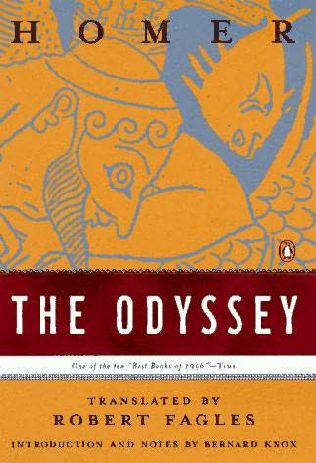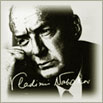
My Paper:
As a poet and a critic, T.S. Eliot filled two seeming opposed roles in the literary world. In both his poetry and his critical works, Eliot expressed a belief that the nature of time is cyclical, and that the past, present and future influence each other. “Tradition and the Individual Talent” is one such work of literary criticism, wherein Eliot argues that a poet does not write in a vacuum, but rather with every new piece of literature he writes, he dips into the tradition set before him by the literary canon of the past. That is, his new work would not be possible without the old. However, Eliot, in writing about the inevitable all-inclusive nature of poetry, excluded something very important. In referring to capital T “Tradition” in this essay, Eliot confines the term to the literary canon, ignoring the fact that without the Oral Tradition set before it, the literary tradition could not have possibly came into existence.
In “Tradition and the Individual Talent”, Eliot seeks to define the notion of “Tradition” as we know it. While he acknowledges that an “existing order” constitutes capital T “Tradition”, he fails to mention an essential part of that order: the Oral Tradition on which it was built, the Oral Tradition which we delved into in class this semester.
“Tradition”, Eliot explains, has historical connotations. However, it doesn’t limit “history” to what’s behind us: “it involves a perception, not only of the pastness of the past, but of its presence; the historical sense compels a man to write not merely with his own generation in his bones, but with a feeling that the whole of the literature of Europe from Homer and within it the whole of the literature of his own country has a simultaneous existence and composes a simultaneous order” (Eliot, “Tradition”). Why would Eliot stop at literature? The reason why a course like “Oral Traditions” is offered for English majors and why the topic of “Orality and Literacy” has been analyzed by a multitude of scholars is because our oral past is so very pertinent to our literate present: a vital part of that “simultaneous order”.
We spend the majority of our studies as English majors being trained and taught in the tradition of great authors like Shakespeare and Milton; the authors of great literature whom Eliot pays homage to in his essay. We take survey courses in order to discover “the importance of the relation of the poem to other poems by other authors” (Eliot, “Tradition”), courses wherein we encounter works like T.S. Eliot’s “Tradition and the Individual Talent”. Most of the time the tradition we study in pursuit of our English degree is, like Eliot’s concept of tradition in the essay, limited to the chirographic and typographic canon. We don’t pay nearly enough attention to all the unnamed storytellers for which the literate tradition arose in the first place. We need to continue in the interest of this class and keep investigating into the Oral Tradition, extending our definition of Tradition beyond Eliot’s, and rediscover our oral roots.
One might ask themselves why, in a class called “oral traditions”, have we ended up devoting so much time to memory theatres, memory systems, discussing the phenomenon of memory and traditions of memorizing. The answer would be because memory is something we own as individuals, but also collectively, on a cultural scale. The way remember can be a personal thing- reflecting on our lives memories, etc- but it is also something we experience collectively as human beings. In remembering our oral roots, we gain deeper insight to our modern minds today, as well as where we are going. And when all this is considered, we can see time, memory, and tradition as Eliot saw it: completely infinite.
Every piece of our culture needs a memory device to keep going; to progress. Data is kept and history is recorded so that we have something to refer back to, so we don’t lose the knowledge we’ve established, so we can keep moving forward. Without the past in mind, we couldn’t exist in the present or advance into the future. We are perpetuated by memory. In “Tradition and the Individual Talent”, Eliot makes this assertion in the context of authorship.
What Eliot didn’t say in “Tradition and the Individual Talent” he made up for in “Little Giddy”, the fourth poem of “The Four Quartets” where he acknowledges the interconnected nature of the written canon he analyzed in that essay. “Every phrase and every sentence is an end and a beginning; Every poem an epitaph” (Eliot, “Four Quartets”). He closes the poem with some of the most important words to any English major: “We shall not cease from exploration. And the end of all our exploring will be to arrive where we started and know the place for the first time” (Eliot, “Four Quartets”).
This statement shares the theme of “Tradition and the Individual Talent” in asserting that the past is not confined to history, the past is in our present and our future. In all that we read, and learn, and do, the goal is to “arrive where we started and know the place for the first time” (Eliot, “Four Quartets”). This is the deepest essence of remembering: to recall, in light of our most current selves, in our most current mindset, notions of the past. We bring the past to the present.
The past, the present and the future play off of each other in all aspects of human existence; “The existing monuments form an ideal order among themselves, which is modified by the introduction of the new” (Eliot, “Tradition”). We have learned that our current transition from a literate culture to a cyber one mirrors the initial transition from orality to literacy. In studying that long-sense crossed boundary between oral consciousness and the literate mind, we better understand the modifications that are currently taking place in the literate world. It’s all relevant. Past, present, future; Oral, literate, technological: it’s all relevant.We are on the verge of completing a course in “Oral Traditions”. At this time I, like Eliot, feel the desire to analyze what constitutes this “Tradition” that we refer to. When Eliot defines “Tradition” in his essay as “the existing order” I think he leaves something vital out of the order he refers to. In speaking of the literary canon and the literary tradition that haunts any new author, he fails to mention that this order began in the oracular and progressed from there to the literate world as we now know it.







